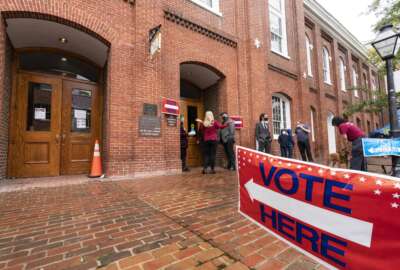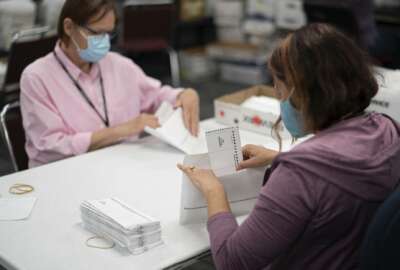
AFGE files grievance over VA facilities limiting time off for employees to vote
The largest federal employee union is claiming several Veterans Affairs Department facilities unfairly limited or denied administrative leave to employees looki...
The largest federal employee union is claiming several Department of Veterans Affairs facilities unfairly limited or denied administrative leave to employees looking to vote, as mandated by the Biden administration.
President Joe Biden signed an executive order in March granting federal employees up to four hours of administrative leave to vote or serve as a non-partisan poll worker on Election Day.
But the American Federation of Government Employees claims VA management at several facilities restricted administrative leave in the days leading up to Election Day for “unjustified reasons.”
AFGE, in a national grievance filed on Nov. 5, called on the VA to address its concerns. The grievance states employees reported noncompliance at facilities in Milwaukee, Wisconsin; Asheville, North Carolina; Atlanta; Marion, Indiana and Brooklyn.
The incidents highlighted in AFGE’s national grievance are an exception to VA otherwise fully implementing the executive order’s requirements, by the union’s own estimation. But the grievance, and other examples across the federal government, underscore the lengths agency management and union officials have gone to in order to implement the EO ahead of Nov. 8.
Thomas Dargon, supervisory attorney for AFGE’s National VA Council, estimates members have reported issues receiving administrative leave to vote at about a dozen VA facilities.
“They range all over the country. It’s not one particular facility or one particular region, but rather facilities all over the country for VA,” Dargon said.
Among the remedies requested, AFGE seeks remedial training for managers to comply with the executive order, and for the agency to “make-whole adversely affected AFGE bargaining unit employees,” by providing including back pay, leave restoration and attorney’s fees.
Dargon said senior VA leadership assured the union that employees are entitled to the leave outlined in the EO. “But the problem remains at the facility level, where those leave requests are submitted and either approved or denied,” he said.
VA Press Secretary Terrence Hayes said in a statement Monday that the VA chief of staff sent a reminder to all employees on Nov. 7 about the current policy for administrative leave for voting and for non-partisan volunteer activities.
“All employees received a copy of the policy and related guidance for clarity. If any employee believes he or she was not given the opportunity to vote, as outlined in the VA guidance, we encourage them to immediately raise this issue to their leadership,” Hayes said.
AFGE’s national grievance, filed Nov. 5, states VA management officials denied or limited the use of administrative leave by employees for reasons not supported by the executive order or guidance from the Office of Personnel Management.
The union claims VA managers and supervisors justified denying or limiting administrative leave because polling locations were open before or after an employee’s tour of duty, or because polling locations were close proximity to VA facilities.
The national grievance states that a management official at the Milwaukee Veterans Benefits Administration’s Regional Office denied leave requests because, “We cannot grant administrative leave for voting unless [polls] are not open before or after an employee’s TOD.”
Another management official told VA employees at one facility they could only receive a limited amount of administrative leave, sometimes as little as 30 minutes.
“If you’ve ever voted before in person, you know [that] sometimes you get there and the line’s out the door. It’s around the corner. It’s taking longer than 30 minutes to travel to the polling location to participate and to drive back to work,” Dargon said.
AFGE expects a formal response from VA to its national grievance by about mid-December, if not sooner. Dargon said the union seeks to resolve the case, and collect more information on how many employees were denied administrative leave to vote.
If, however, the union is not able to resolve the matter, Dargon said the case would proceed to arbitration.
“It’s disappointing to have to do this, especially in the Biden administration, where the messaging on voting and removing access to removing barriers for voting access has been so strong. But here we are,” he said.
Dargon, however, stressed that employees have only reported noncompliance at only a handful of the several hundred VA facilities it represents.
“I don’t want to suggest that it’s a problem at every facility. I’m sure there were facilities that implemented this correctly, that there were supervisors who properly granted these requests for administrative leave. But having this issue come up at 12 facilities is far too many,” he said.
OPM, in its guidance implementing the executive order, allows federal employees to take administrative leave for any travel time to and from their poll location, and they may also take administrative leave for early voting.
OPM, in its EO guidance, states granting administrative leave for voting is “subject to a determination by the agency that the employee can be relieved of duty during the specific period of time requested by the employee without significantly impairing mission essential operations.”
“Delivery of agency missions is the top priority for federal employees, so agencies should require that employees obtain the approval of their supervisors before using the authorized administrative leave, so that the use of this leave does not significantly disrupt agency operations,” the OPM guidance states.
OPM’s guidance specifies that if an employee needs to spend less than four hours to vote, the agency should only grant the “needed amount” of administrative leave.
OPM also prohibits employees from using this administrative leave during a non-work day or during overtime work hours.
AFGE’s national grievance states that “despite unequivocally clear instructions from President Biden and OPM,” management officials at these dozen facilities denied requests for administrative leave.
Dargon said OPM doesn’t need to further clarify its guidance, but called on VA to clarify the policy to its regional field offices.
“I think the guidance side out of OPM was crystal clear. The problem is that too much discretion was left to facility managers to implement the executive order and to create exceptions that were not in it, or the OPM guidance. I think we need stronger messaging and stronger guidance from VA central office directing facilities as to how they should implement and comply with the executive order,” he said.
IRS fully implements executive order a week out from Election Day
The VA isn’t the only agency to clarify its administrative leave policy for voting in the days leading up to the midterm election.
The IRS fully implemented requirements under the EO, and to the satisfaction of union officials, but finalized that work about a week out from Election Day.
The IRS, in an internal all-staff email, told employees on Oct. 26 that the agency “must fulfill its bargaining obligations before an updated policy can be implemented.”
Prior to finalizing its collective bargaining obligations, the IRS said its “current voting policy,” prior to the Biden administration executive order, would continue to apply.
“Once negotiations are complete, we’ll finalize and communicate the expanded voting administrative leave policy,” the email stated.
Tony Reardon, national president of the National Treasury Employees Union, said the union concluded negotiations with the IRS on Nov. 1, which gave IRS employees “immediate access to administrative time to vote early or on Election Day.”
“NTEU was pleased to reach an understanding with the IRS to ensure that employees had administrative time to get to the polls, in line with President Biden’s executive order,” Reardon said.
The agreement between the IRS and NTEU, Reardon added,” supplemented existing contract language by providing administrative leave regardless of the employees’ tours of duty and the hours of their polling places, while ensuring the leave did not impair mission-critical functions.”
The IRS said in a statement that it concluded bargaining with NTEU prior to implementing the EO “because it was obligated to do so under existing statutes.”
“Under the law, an agency must provide the exclusive representative with notice of, and an opportunity to bargain over, the areas of change that are within the duty to bargain,” the IRS said.
The IRS, prior to the executive order taking effect, allowed managers to grant administrative leave for employees to vote in cases where polls weren’t open at least three hours before or after an employee’s regular hours of work.
“You may report to work up to three hours after the polls open or leave work up to three hours before the polls close, whichever requires less time off,” the Oct. 26 all-staff email stated.
IRS employees under this old policy could also seek administrative leave for early voting, but only if they were unable to vote on the day of the election “because of activities related to the IRS mission (such as travel) and cannot vote by absentee ballot.”
Employees would also only be eligible for early voting if early voting hours are the same as, or exceed the voting hours on the day of the election.
Copyright © 2024 Federal News Network. All rights reserved. This website is not intended for users located within the European Economic Area.
Jory Heckman is a reporter at Federal News Network covering U.S. Postal Service, IRS, big data and technology issues.
Follow @jheckmanWFED





